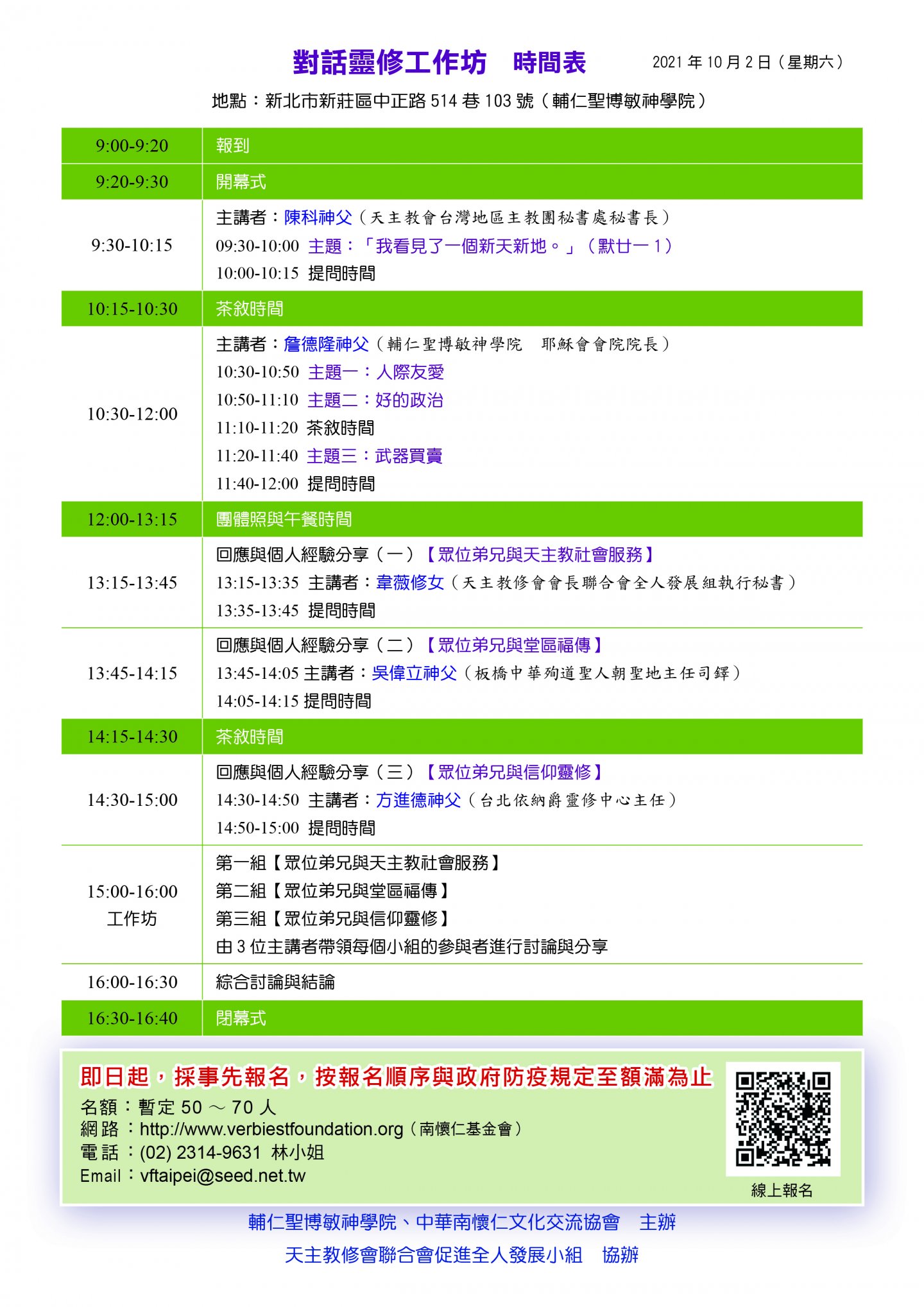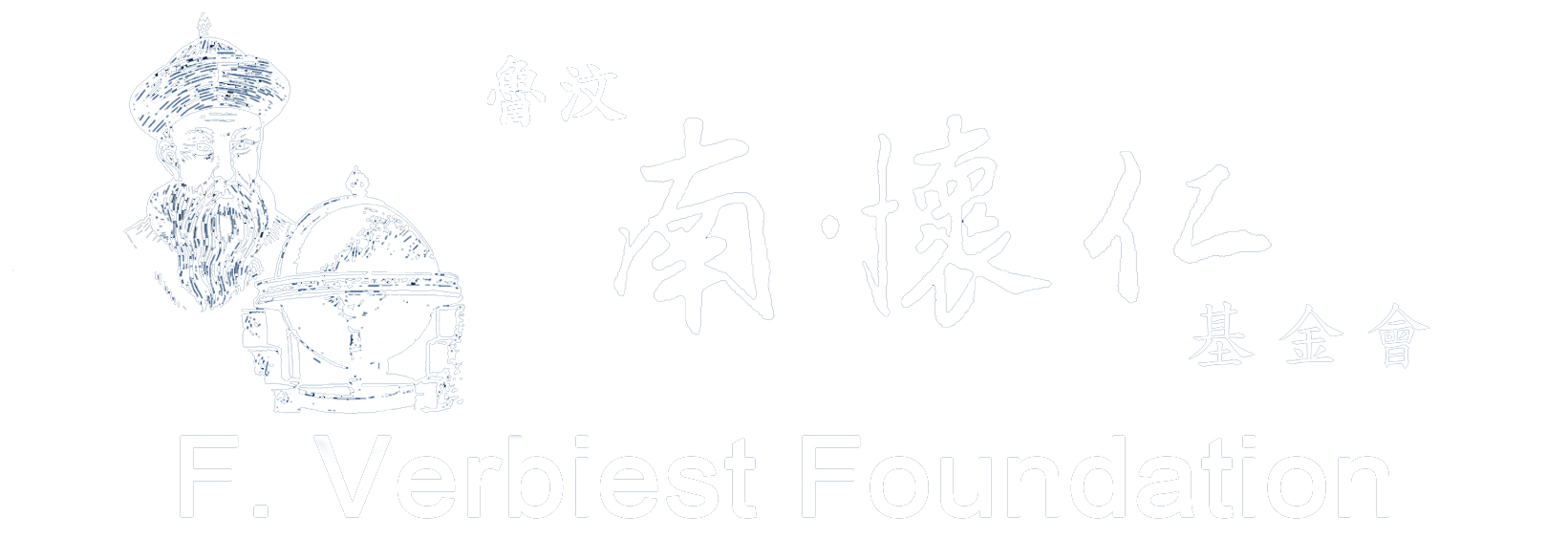Third Workshop in the Spirituality of Dialogue
Fratelli Tutti: A call to love that transcends the barriers of geography and distance
2021 Workshop
第三屆 對話靈修工作坊
《眾位弟兄》: 活出超越地域和空間阻隔的愛
1. Organizer主辦單位:
Fu Jen Faculty of Theology of St. Robert Bellarmine
Fu Jen Faculty of Theology of St. Robert Bellarmine
輔仁聖博敏神學院
Chinese Ferdinand Verbiest Cultural Exchange Association
中華南懷仁文化交流協會
2. Co-organizer協辦單位:
天主教修會聯合會促進全人發展小組
天主教修會聯合會促進全人發展小組
Regional Association of Major Religious Superiors of Men and Women in Taiwan
3. Venue地點:
Fu Jen Faculty of Theology of St. Robert Bellarmine
Fu Jen Faculty of Theology of St. Robert Bellarmine
輔仁聖博敏神學院 大禮堂
(地址: 新北市新莊區中正路514巷103號)
(地址: 新北市新莊區中正路514巷103號)
4. Time時間:
Oct. 2, 2021, Saturday, 9:00~16:40
民國110年10月2日(六)上午9:00~下午16:40
Oct. 2, 2021, Saturday, 9:00~16:40
民國110年10月2日(六)上午9:00~下午16:40
5. The number of participants scheduled預定參與人數:
50 ~ 70 人(視當時政府防疫規定辦理)
(tentative / will comply with the directives of the government)
CST has dialogue and transcendence as its points of departure. It is a call to start a conversation among multiple actors beyond their particular differences and seek together the common good. But if we believe in the call of the Gospel to transform the world from the perspective of the kingdom of God, then it is crucial to make it clear what kind of society, politics, economy… are in line with the building of the kingdom that is to come. During the last 70 years Catholic theology, especially liberation theology and contextual theology, has invited us to turn our gaze from the ineffable God to human concreteness, something expressed quite vividly in the first letter of John: “Whoever says, ‘I love God,’ but hates his brother is a liar. The one who does not love his brother whom he has seen cannot love the God whom he has not seen” (1 Jn 4:20).
The Christian Gospel and our mission to bring it to the ends of the earth will always be confronted as a lie and hypocrisy until we put the human person at the center of our theological inquiry and our Catholic life, as Jesus did and asked us to do when he called us not servants but friends (Jn 15:15). This rearrangement of the Catholic “loci theologici” has become a priority in Pope Francis’ guidance of the Church. Through his encyclicals and letters he is inviting us to overcome our fears and make it an ecclesial priority too, including those “uncomfortable” situations and realities that have been traditionally “biased-sided” by theological dialogue like the persistent inequality towards women in society (and the Church) and the patriarchal system that sustains it, the centrality of the human person and the “common good” in the economy and the limits this imposes on private property and profit, the importance of transparent, participatory and empowering political processes and the commitment of all—from individual believers to Catholic organizations—to put ourselves to work in building up a society transformed by the values of the Gospel.
This commitment for transformation is linked to witnessing, to put our faith to work (James 2:18), so that we do not end like the scribes and pharisees of Jesus’ times, “who do not practice what they preach” (Mt 23:3), something that others, like Gandhi, also observed in more recent times: “I consider Western Christianity in its practical working a negation of Christ's Christianity” (Young India, 22-9-1921).
"Fratelli Tutti” invites us to believe in dialogue as the tool to build human fraternity and encourages us to realize that when we come together, it will be faster if we start walking from both ends of the road. For Fu Jen Faculty of Theology of St. Robert Bellarmine, Verbiest Foundation and Verbiest Cultural Association “dialogue” is an inspirational pillar, and this series of Workshops in the Spirituality of Dialogue is an expression of our commitment to promote the exchange of ideas and visions as the best way to build our common future both as a human society and as a Church that is truly Catholic.
With the Trinity as a model of life, this third workshop is a little step in the right direction to bring together in a continuous exchange of creative energy the seeds and fruits we discover in our Christian daily life and the challenging Christian social vision presented by Pope Francis in FT.
(1) Topic: The 2020 encyclical of Pope Francis “Fratelli Tutti” [衆位弟兄- FT] (on Fraternity and Social Friendship).
(2) Several speakers will give input and lead participants to reflect in depth on the encyclical insights and share their thoughts or opinions about the content.
(3) Workshop timetable時間安排:




8. Registration Information報名資訊:
1. Registration is ‘on pre-registration’ and ‘on a first-come-first-served’ basis. Registration starts from now, and the number of full registrations will be in accordance with the government’s epidemic prevention regulations.
自即日起採事先報名,按報名順序與政府防疫規定至額滿為止。
2. Online registration網路報名: http://www.verbiestfoundation.org(南懷仁基金會)(網路報名已額滿)
3. Phone registration 電話報名: (02)2314-9631林小姐
4. Email registration (Email報名) : vftaipei@seed.net.tw
5.(錄影播出訊息與活動報導) 對話靈修工作坊~《眾位弟兄》: 活出超越地域和空間阻隔的愛


50 ~ 70 人(視當時政府防疫規定辦理)
(tentative / will comply with the directives of the government)
6. The introduction 計劃緣起
130 years have passed since Pope Leo XIII signed the encyclical Rerum Novarum (On Capital and Labor) on May 15, 1891. It was not something “new,” but a first effort to systematize Catholic Social Teaching (CST) and respond to the challenges to the life of Catholics and the Church at the end of the XIX century brought about by the new realities of the Industrial Revolution and the processes of urbanization. After 130 years CST still remains unknown to the common lay person and is, sometimes even, regarded as "marginal" and a “lesser theology”.
CST has dialogue and transcendence as its points of departure. It is a call to start a conversation among multiple actors beyond their particular differences and seek together the common good. But if we believe in the call of the Gospel to transform the world from the perspective of the kingdom of God, then it is crucial to make it clear what kind of society, politics, economy… are in line with the building of the kingdom that is to come. During the last 70 years Catholic theology, especially liberation theology and contextual theology, has invited us to turn our gaze from the ineffable God to human concreteness, something expressed quite vividly in the first letter of John: “Whoever says, ‘I love God,’ but hates his brother is a liar. The one who does not love his brother whom he has seen cannot love the God whom he has not seen” (1 Jn 4:20).
The Christian Gospel and our mission to bring it to the ends of the earth will always be confronted as a lie and hypocrisy until we put the human person at the center of our theological inquiry and our Catholic life, as Jesus did and asked us to do when he called us not servants but friends (Jn 15:15). This rearrangement of the Catholic “loci theologici” has become a priority in Pope Francis’ guidance of the Church. Through his encyclicals and letters he is inviting us to overcome our fears and make it an ecclesial priority too, including those “uncomfortable” situations and realities that have been traditionally “biased-sided” by theological dialogue like the persistent inequality towards women in society (and the Church) and the patriarchal system that sustains it, the centrality of the human person and the “common good” in the economy and the limits this imposes on private property and profit, the importance of transparent, participatory and empowering political processes and the commitment of all—from individual believers to Catholic organizations—to put ourselves to work in building up a society transformed by the values of the Gospel.
This commitment for transformation is linked to witnessing, to put our faith to work (James 2:18), so that we do not end like the scribes and pharisees of Jesus’ times, “who do not practice what they preach” (Mt 23:3), something that others, like Gandhi, also observed in more recent times: “I consider Western Christianity in its practical working a negation of Christ's Christianity” (Young India, 22-9-1921).
"Fratelli Tutti” invites us to believe in dialogue as the tool to build human fraternity and encourages us to realize that when we come together, it will be faster if we start walking from both ends of the road. For Fu Jen Faculty of Theology of St. Robert Bellarmine, Verbiest Foundation and Verbiest Cultural Association “dialogue” is an inspirational pillar, and this series of Workshops in the Spirituality of Dialogue is an expression of our commitment to promote the exchange of ideas and visions as the best way to build our common future both as a human society and as a Church that is truly Catholic.
With the Trinity as a model of life, this third workshop is a little step in the right direction to bring together in a continuous exchange of creative energy the seeds and fruits we discover in our Christian daily life and the challenging Christian social vision presented by Pope Francis in FT.
130年前,教宗良十三世於 1891 年 5 月 15 日簽署了《新事》(Rerum Novarum)通諭,藉以剖析勞動和資本的關係。這一道通諭雖然不是「新」觀點,卻是天主教會在面對現代社會問題時,重新將福音價值條理化,並反應出教友生活與教會在十九世紀末工業革命新現實及城市化過程中所面臨的各種挑戰。 130 年後,天主教社會訓導仍然不為一般平信徒所認知,有時甚至被視為「邊緣」和「次等」神學。
天主教社會訓導以對話和超越為出發點,呼籲在多個不同角色之間展開對話,超越其特定差異,並一起尋求共同益處。 但是,既然我們相信福音的召叫,是要以天主國度的視角來改變世界,其關鍵點就需要先釐清什麼樣的社會、政治、經濟狀況……能夠與天國的建構相符。 在過去的 70 年裡,天主教神學,尤其是解放神學和處境神學,邀請我們將目光從難以言喻的天主轉向具體的人性,若望一書中非常生動地表達了這一點:「假使有人說:我愛天主,但他卻惱恨自己的弟兄,便是撒謊的;因為那不愛自己所看見的弟兄的,就不能愛自己所看不見的天主。」(若望一書 4:20)
如果我們無法將人類放在我們神學探究和教友生活的中心,基督福音與我們期望將福音帶到地極的使命就會永遠被視為謊言和虛偽的表象,如同耶穌在稱我們為朋友而不是僕人時所做的(若望福音 15:15),祂期望我們以天主兒女的身分,將人類視為重要的朋友而非僕人,持續傳播福音。對天主教「神學反省資料及方法」的重新詮釋,已經成為教宗方濟各對教會指導的首要原則。透過教宗的通諭和書信,他邀請我們克服恐懼,並將其作為教會的優先事項,包括一直以來被神學對話視為邊緣且令人不舒服的處境和現況,例如: 1. 削弱社會上(和教會內)對婦女的不平等及支持此不平等的父權制度;2.降低因經濟的「共同利益」 而忽略以人類為中心地位的現況;3.對個人私有財產與利潤施加限制,使自由經商的權利,不會凌駕人民的權利和窮人的尊嚴,也不會凌駕對環境的尊重;4. 重視透明參與和賦予權力的政治過程,以及所有人的承諾 - 從信友個人到天主教會組織 - 致力於建立一個被福音價值觀轉化的社會。
這種轉化世界的承諾與實際的見證息息相關,也就是將我們的信仰付諸實踐(雅各伯書 2:18),如此我們就不會像耶穌時代的經師和法利賽人一樣「不實踐他們所宣講的」(瑪竇福音 23 :3),或是如同近代的甘地所做的觀察:「我認為西方基督教實際上是在其工作實踐上否定了耶穌基督的基督教」(青年印度Young India,22-9-1921)。
教宗方濟各《衆位弟兄》(Fratelli Tutti) 通諭邀請我們相信「對話」是建立人類友愛的工具,並鼓勵我們認識: 當我們要聚在一起時,如果我們從道路的首尾兩端開始面對面走,會更快相遇。 對於輔仁聖博敏神學院、魯汶南懷仁基金會和中華南懷仁文化交流協會來說,「對話」是鼓舞人心的支柱,而我們召開這一系列對話靈修工作坊,正是表達了我們致力於促進彼此思想與視野相互交流的承諾,也是為人類社會和真實普世教會建構共同未來的最佳方式。
因著以天主聖三作為生活的典範,並以充滿創造力的能量,將我們在基督徒日常生活中發現的果實、種子,與教宗方濟各在《衆位弟兄》通諭中提出的、具有挑戰性的基督化社會願景,匯集在一起,這第三屆工作坊的舉辦可說是朝著正確方向邁出的一小步。
7. Schedule 計畫:
(1) Topic: The 2020 encyclical of Pope Francis “Fratelli Tutti” [衆位弟兄- FT] (on Fraternity and Social Friendship).
主要以教宗方濟各《衆位弟兄》通諭為討論主題。
(2) Several speakers will give input and lead participants to reflect in depth on the encyclical insights and share their thoughts or opinions about the content.
幾位主講者將帶領參與者進行討論與分享
(3) Workshop timetable時間安排:




8. Registration Information報名資訊:
1. Registration is ‘on pre-registration’ and ‘on a first-come-first-served’ basis. Registration starts from now, and the number of full registrations will be in accordance with the government’s epidemic prevention regulations.
自即日起採事先報名,按報名順序與政府防疫規定至額滿為止。
2. Online registration網路報名: http://www.verbiestfoundation.org(南懷仁基金會)(網路報名已額滿)
3. Phone registration 電話報名: (02)2314-9631林小姐
4. Email registration (Email報名) : vftaipei@seed.net.tw
5.(錄影播出訊息與活動報導) 對話靈修工作坊~《眾位弟兄》: 活出超越地域和空間阻隔的愛



